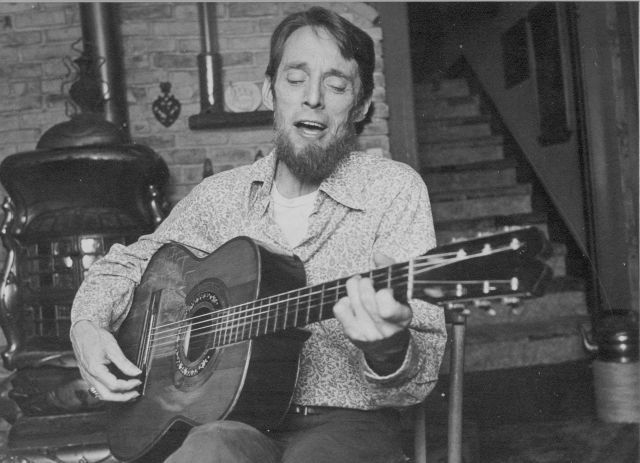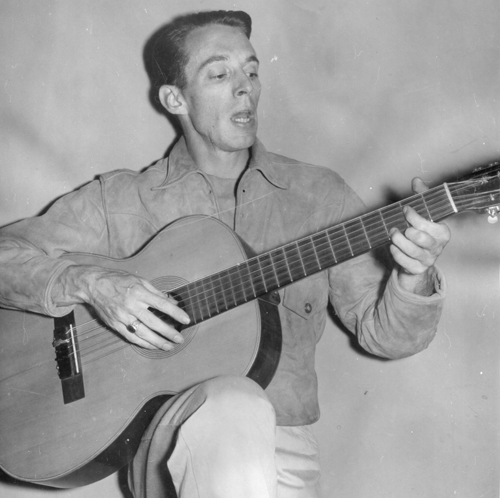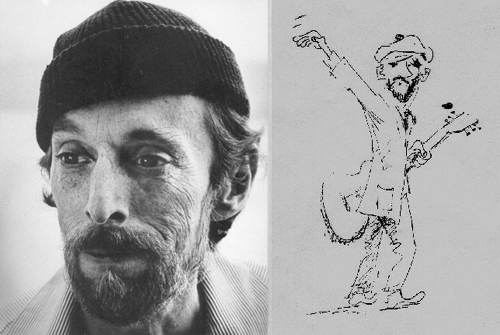My first impression of him was of a smallish man with long brown hair and a devilish gleam in his eye. Even at first glance I could tell there was an air of magnetism about him. But it was when he picked up his twelve-string guitar, strummed a chord, and started singing that he stopped you in your tracks. I instantly knew this guy was a real force.
His voice was strong rich and mellow. He was in full command of his pitch and his diction was simply superb.
Wandering - sung by Walt Robertson
In 1954, Pete Seeger came to Seattle for a concert. Walt invited Pete to stay for a few days on his in-famous floating houseboat on Lake Union. At this time, Pete was being blacklisted as a Communist by the HUAC. Soon after Pete left Seattle, Walt was visited by the FBI and subsequently he lost his Contentious Objector status with the draft, because of his friendliness with Pete Seeger. Walt quickly found himself, hisself as he used to say, in the Army stationed in Stuttgart, Germany.
One of Walt’s strengths was his amazing ability to make lemonade out of lemons. Realizing his opportunity, he soon got himself assigned to an Army USO troupe touring Europe. While touring, he perfected his stagecraft, both as a singer and an actor.
Some recordings of Walt are in the Bob Nelson Collection of Folk Music Archives at the University of Washington.
WHAT TO LISTEN FOR
From my archives I have chosen three songs that I feel demonstrate Walt’s voice and guitar work. This first example was recorded live at a concert he gave in Seattle in 1957. The song is “Come All You Fair And Tender Maidens.”
Come All You Fair and Tender Ladies - sung by Walt Robertson
Notice the quiet guitar, very reminiscent of the style of Burl Ives. While Walt was very competent on the guitar, he also knew when to keep the guitar out of the way and let the song speak for itself. And also notice the lyrical style of his singing. I can still see him singing as he held the audience spellbound in the palm of his hand.
This second example is the blues song “Where Did You Sleep Last Night” The occasion was a dining room table conversation with friends on Hood canal in 1979. Walt was giving a guitar lesson to the teenage son of the family.
Where Did You Sleep Last Night? - sung by Walt Robertson
Listen carefully and you will hear occasional background talking and laughter. But also listen to what he could do with his guitar when he wanted. You’ll hear some of Josh White’s influence in this piece.
The last example is the classic “Nobody Knows You When You’re Down and Out”. This sample was taken from the same family gathering at Hood Canal.
Nobody Knows You - sung by Walt Robertson
When he sang this song, the “actor” in Walt comes through. He knew how to milk the words and squeeze out every possible nuance. His eyes would dance with inner meaning. He was a total performer.
WALT’S IMPACT
Walt showed us, by example, how to succeed as performers. He was careful with his performance advice and only offered it to close friends or when his advice was requested. I well remember when I was just sixteen and I was at a Seattle hoot. That night, for the first time, I heard him play and sing “Black Girl.” I was fascinated with his guitar work. Later that evening, he took me to a quiet corner and taught me just how to play it on the guitar. If he liked you, he could be very generous. He also showed many of us just how to get the bigger gigs that were becoming available in the better Seattle clubs like the many restaurants owned by Ivar Haglund, “The Colony Club”, as well as the local radio and TV shows.
In addition to his folksinging, he also had local successes on stage. During the 1970’s he was a frequent actor with the “Driftwood Players”, in Edmonds as well as other local productions. I once flew to Hawaii to see him play the male lead in “Shadowlands.” He was also a member of the “Screen Actor’s Guild and had occasional bit parts in Hollywood Movies, including “An Officer and Gentleman.”
Walt had a serious itchy foot and he scratched it all over the world. He traveled through most states in this country, as well as many places in Canada, Europe, Micronesia, Australia and New Zeeland. His last seven working years were spent as an editor with the University of Hawaii. He returned to his beloved Puget Sound country in 1994, buying a condo in Kingston. He’d only been back “home” nine months when he was diagnosed with terminal pancreatic cancer, which killed him in 1994.
Three weeks before he passed, his many friends held a farewell hoot in his honor. They came from all over: Canada, Washington, Oregon, California and Hawaii. This was a hoot to remember. It started in the afternoon and lasted to well past midnight. The stories and songs flowed like the days of old. Everyone was amazed when, late into the night, Walt belted out one of his most demanding signature songs: “Don’t Lie, Buddy, Don’t Lie.” Walt died three weeks later.
In the next issue I will present Don Firth, as I know him.
Bob Nelson
RETURN TO SEATTLE FOLKSINGERS


